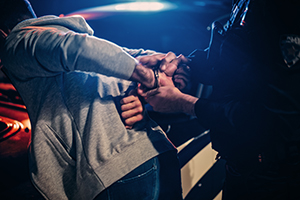Connecticut General Statutes §14-223 – Disobeying the Signal of an Officer
 Under Connecticut General Statutes §14-223, it is illegal to ignore or refuse to stop when signaled by a police officer. This law applies to situations where an officer activates their lights, siren, or gives a clear hand signal for a driver to stop.
Under Connecticut General Statutes §14-223, it is illegal to ignore or refuse to stop when signaled by a police officer. This law applies to situations where an officer activates their lights, siren, or gives a clear hand signal for a driver to stop.
The statute has two distinct parts:
- §14-223(a): A motor vehicle violation for failing to stop promptly when signaled by police.
- §14-223(b): A criminal offense for willfully fleeing, attempting to elude, or engaging in reckless conduct while failing to stop — which can range from a Class A misdemeanor to a Class D felony.
Understanding the difference between a simple violation under (a) and a criminal offense under (b) is critical because the consequences escalate dramatically.
Elements of the Crime the Prosecution Must ProveSubsection (a) – Violation (Failure to Stop Promptly)To establish liability under §14-223(a), the State must show:
- You were operating a motor vehicle;
- A uniformed police officer (or one displaying a badge) gave a clear signal to stop (lights, siren, or hand signal); and
- You failed to stop promptly in response.
This is not a crime, but a motor vehicle violation punishable by fines and license consequences.
Subsection (b) – Criminal Offense (Eluding or Reckless Conduct)To convict under §14-223(b), the State must prove:
- You were operating a motor vehicle;
- A uniformed officer (or one displaying a badge) gave a clear signal to stop; and
- You willfully fled, attempted to elude, or engaged in reckless driving or conduct creating a substantial risk to others.
This subsection carries criminal penalties and can result in jail time, license suspension, and a permanent criminal record.
Penalties Under Connecticut General Statutes §14-223Subsection (a) – Basic Violation:- Fine only (no jail);
- DMV points and potential insurance increases;
- No criminal record, but can still impact your driving history.
- Class A Misdemeanor (Eluding without Reckless Endangerment):
- Up to 1 year in jail;
- Fines;
- Possible license suspension.
- Class D Felony (Eluding with Reckless Driving or Endangerment):
- Up to 5 years in prison;
- Significant fines;
- Mandatory license suspension;
- Permanent felony record.
- Violation under §14-223(a): A driver on Route 7 doesn’t notice the officer’s lights immediately but pulls over safely within a short distance. This is a motor vehicle violation, not a crime.
- Misdemeanor under §14-223(b): A driver intentionally avoids pulling over for several miles on I-95 but does not drive recklessly or endanger others. This is a Class A misdemeanor.
- Felony under §14-223(b): A driver accelerates, runs multiple red lights, and nearly causes an accident while fleeing in Bridgeport. This is a Class D felony under §14-223(b).
- Connecticut General Statutes §53a-167a – Interfering with an Officer
- Connecticut General Statutes §53a-64 – Reckless Endangerment (often charged alongside §14-223(b))
- Connecticut General Statutes §14-222 – Reckless Driving
Possible defenses include:
- No Willfulness (Subsection b): You did not intentionally flee — perhaps you were seeking a safe location to stop.
- Diversionary program: Accelerated Rehabilitation Program for first time offenders
- Lack of Signal or Identification: The officer’s signal was not visible/audible, or they cannot prove you were the driver.
- Constitutional Violations: Illegal stops, lack of probable cause, or unlawful pursuit tactics may lead to suppression of evidence.
- Negotiated Resolutions: In some misdemeanor cases, a defense attorney can reduce the charge to a non-criminal infraction to avoid a record.
If you are facing charges under Connecticut General Statutes §14-223 – Disobeying the Signal of an Officer, act quickly. Contact Attorney Allan F. Friedman today for a free, confidential consultation.
📞 (203) 357-5555 – We are available 24/7 to defend your rights and your freedom.
 Allan F. Friedman Criminal Lawyer Home
Allan F. Friedman Criminal Lawyer Home











